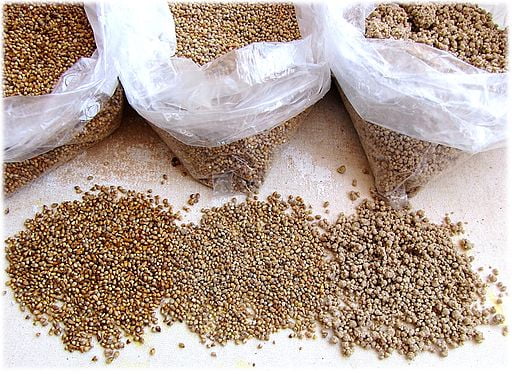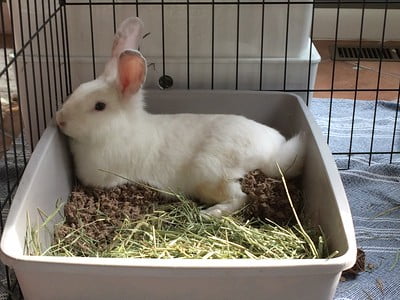Last Updated on March 2, 2023 by Marjon Ramos
Rabbits should eat a lot of hay, about the size of their bodies per day. But a much better approach is to just buy a huge hay rack and let your rabbit decide how much hay they need to consume.
Rabbits will usually stop eating when they are full. It’s far better to let them decide how much fiber they can consume. Limiting hay would only put your rabbit at risk of digestive distress.
As we all know, the most important part of a rabbit’s diet is fiber (hay). Without it, rabbits are at risk of developing dangerous digestive conditions like GI stasis or diarrhea.
Now that I’ve given you the gist of the article, read on as I explain in more detail how much hay a rabbit should eat:
Table of Contents
Can rabbits eat too much hay?

It depends on what kind of hay your rabbit is eating. If you’re feeding alfalfa hay (high in calcium), it could potentially cause problems when fed in large amounts.
Rabbits excrete their excess calcium by urinating. If they’re consuming too much calcium, it could lead to urinary stones.
But for safer hay like timothy hay, then no, rabbits can’t overeat too much hay. In fact, it’s much better for your rabbit to eat a lot of hay. Their digestive systems are literally designed for digesting fiber.
Rabbits that are not getting enough fiber are at risk of digestive problems. Some of these digestive problems can even cost them their lives if not treated.
Can rabbits survive on just hay?

Yes, rabbits can survive on just hay. Rabbits’ digestive systems are designed for digesting fiber. Without it, your rabbit would become sick. Various digestive conditions caused by a low-fiber diet can also lead to death if not treated.
Should rabbits have unlimited hay?

Yes, rabbits should have unlimited amounts of hay, especially for young, growing rabbits. Young rabbits need all the nutrients they can get to maximize growth.
Here’s a table to guide you on how much you should feed your bunnies as they get older.
| Age | Hay |
|---|---|
| 7 weeks to 7 months | Unlimited alfalfa |
| 12 weeks | Unlimited alfalfa |
| 7 months to 1 year | Introduce grass hay, decrease alfalfa |
| Adult (1-5 y) | Unlimited grass hay, oat hay, straw |
| Seniors (>6 y) | Increase alfalfa hay fed to frail, older rabbits but monitor calcium levels |
What kind of hay is best for rabbits?

There are two kinds of hay that are popular for rabbits: alfalfa and timothy hay. While both have advantages, alfalfa is higher in protein and calcium. This makes them preferable for growing rabbits.
Alfalfa hay could also lead to urinary stones due to its higher calcium content. That’s why most veterinarians would suggest sticking to timothy hay.
What’s the risk of not feeding enough hay to rabbits?

Hay should make up the majority of your rabbit’s diet. Without it, your rabbit may develop digestive issues such as:
- GI stasis: The cause of gastrointestinal stasis in rabbits is a diet that’s high in starch and low in fiber. This type of diet causes an imbalance in the rabbit’s gut flora.
- Diarrhea: Diarrhea in rabbits is most often caused by a sudden change in a rabbit’s diet or when fed a low-fiber diet. Diarrhea in rabbits is dangerous and can be fatal. Bring your rabbit to a veterinarian if you notice any changes in their stool.
- Soft uneaten cecotropes: Soft uneaten cecotropes are most often caused by a high-carb, low-fiber diet. It can be fixed by feeding large amounts of fiber (hay).
- Dental problems: Rabbits need to keep eating hay in order to keep their teeth short. Without constant access to hay, your rabbit would eventually develop dental problems like overgrown teeth.
Conclusion
Rabbits should be fed unlimited amounts of hay, especially if they are young and growing.
The best kind of hay for rabbits is timothy hay, which has a lower calcium content than alfalfa.
Buy your rabbit a huge hay rack and let your rabbit decide how much hay they want to eat for the day.
Cite this article:
Sources and further reading
- Patry, Karen, et al. The Rabbit-Raising Problem Solver: Your Questions Answered about Housing, Feeding, Behavior, Health Care, Breeding, and Kindling. Storey Publishing, 2014.
- Understanding the Basics of Rabbit Care
- Basic Rabbit Care
- Rabbit Basics for the Beginner
- The importance of diet in rabbits




